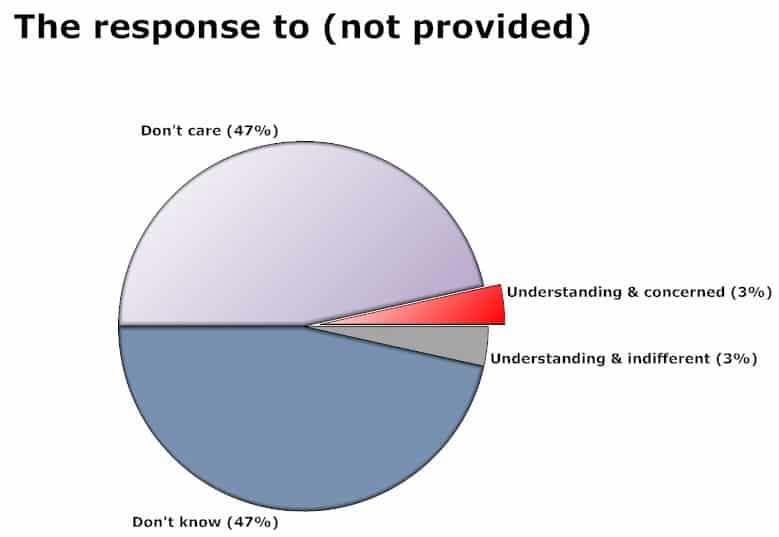You probably already know that Google aren’t reporting all your organic keywords, but the problem may be more serious than you realise.
The background in brief:
In October 2011 Google announced that they would no longer be reporting on the organic keywords used by anyone logged into Google.
In other words if someone is logged into Gmail (for example) and searches on Google then clicks your link from the organic results, you won’t know what keyword was searched for.
Instead it will be reported as (not provided).
If you want the longer explanation you may like to read (not provided) may pollute your Analytics data.
The reaction:
Whenever change is afoot in Google, most people don’t know or don’t care, and the rest are split being understanding & panicking and understanding & not caring.
The general response from those who (at least thought they) understood the issue was to either be concerned or indifferent.
But the interesting thing about fear is that if left without nutrition, it eventually wanes to indifference.
The solutions:
The most popular approaches to dealing with the problem seemed to be one of the following:
– ignore it.
– hope that what you see is representative.
– use Google Webmaster Tools as a source of more reliable information.
– use Google AdWords as a source of more reliable information.
The problems:
The first problem is that the scale of the issue is growing.
When I first wrote about this in November 2011, we saw 16% of the organic keywords reported as (not provided) for our own website.
Today it’s closer to 50%. Yeuch.
And most of our clients are seeing a similar trend over time.
The second problem is that it’s a mistake to believe that the data is representative.
Most techies will be logged into one of Google’s services – Gmail, Calendar, Reader, Analytics, Adwords and so on.
So most searches carried out by techies will therefore fall into the not provided bag.
The problem is that most techies will probably search quite differently from non-techies.
And when I say probably, I of course mean definitely.
So the greater the percentage of searches logged as not provided, the less accurate the logged keywords.
So what should you do about it?
Start by being aware how inaccurate your organic keyword data may be. This is important in itself.
If you don’t yet have a Google Webmaster Tools account, now would be a good time to open one and work out how to use it.
And if you’re using Google AdWords, now may be a time to start looking at the keyword data in a new light.
I’m just starting some research into comparing keyword data from AdWords, Analytics and Google Webmaster Tools – so watch this space.
Unique ideas for your business
The Demystifier puts practical ideas into your hands. You won't find them elsewhere. Original, actionable and insanely effective.





